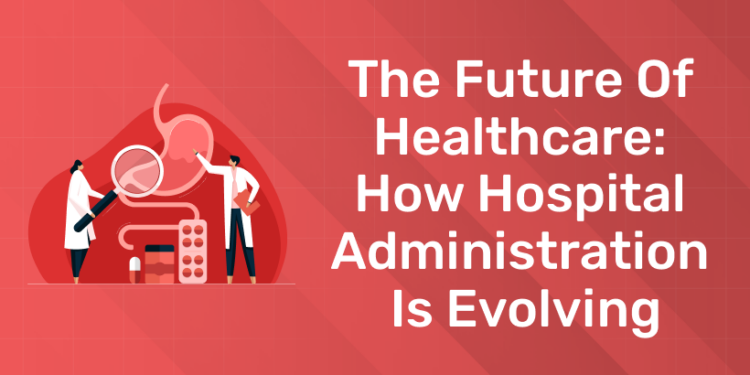Table of Contents
Key Takeaways:
- The future of hospital administration centers on integrating advanced technologies like AI, telemedicine, and blockchain to improve operational efficiency and patient care.
- Patient-centered, value-based care models and sustainability initiatives will dominate hospital strategies, requiring leaders to focus on quality, experience, and eco-friendly operations.
- Tomorrow’s hospital administrators must master interdisciplinary skills, including leadership, technological literacy, financial acumen, and emotional intelligence, to navigate complex healthcare landscapes.
- Continuous adaptability and proactive change management are critical as healthcare regulations, technology, and patient expectations evolve rapidly.
- Education programs, like Entri’s Hospital Administration course, emphasize future-ready skills through practical training, digital health knowledge, and robust placement support for a competitive career start.
Introduction
Imagine walking through a hospital not just as a visitor or patient, but as the person steering the entire operation towards greater efficiency, innovation, and patient care excellence. Hospital administration is rapidly evolving, and today’s administrators are becoming instrumental leaders in shaping the future of healthcare. If you’re wondering where healthcare management is headed and how you can be part of this transformational journey, you are in the right place.
In 2025, hospital administration is more than overseeing day-to-day operations—it’s about embracing cutting-edge technology, rethinking patient care models, and leading sustainable, data-driven initiatives for better health outcomes. This exciting evolution means an increasing demand for skilled professionals who can navigate these changes and make healthcare delivery more effective and accessible than ever before.
What Is Hospital Administration and Why Does the Future Need It
1: What is the primary role of a hospital administrator?
Hospital administration manages the operations behind the scenes to keep healthcare institutions running smoothly. This role involves everything from budgeting and staffing to regulatory compliance and technology integration. As hospitals grow more complex with advanced medical technologies and rising patient expectations, the future hospital administrator must balance business skills with deep healthcare knowledge and a vision for innovation.
Read more at: Responsibilities of Hospital Administrators
Today’s administrators support seamless healthcare experiences through:
- Efficient hospital workflows and resource management
- Adoption of electronic health records (EHR) and telemedicine solutions
- Ensuring legal compliance and quality standards
- Leading teams to adapt to change quickly and effectively
With healthcare becoming more patient-centered, data-driven, and tech-enabled, administrators who stay ahead of these trends will be vital to the healthcare ecosystem’s success.
Hospital Administration Course with Assured Career Growth
Hospital Administration Course by Entri App: Master essential healthcare management skills, gain certification, and secure top roles in leading hospitals
Join Now!The Future is Digital: Technology Transforming Hospital Administration
Technology is revolutionizing hospital administration in ways that will define the future of healthcare management:
- Artificial Intelligence (AI) and Machine Learning: Expect AI to automate routine tasks like scheduling, billing, and inventory control, freeing administrators to focus on strategic leadership. AI analytics will drive better decision-making by predicting patient volumes, optimizing staffing, and spotting inefficiencies.
- Electronic Health Records and Blockchain: Digital patient records will become more advanced, with blockchain solutions providing enhanced security and transparency in data sharing between departments and institutions.
- Telemedicine and Virtual Care: Remote consultations and patient monitoring will be integrated into hospital systems, requiring administrators to oversee virtual care platforms that increase access and reduce hospital overcrowding.
- Automation and Workflow Optimization: From automating admissions to supply chain management, technology will ensure hospitals operate faster, cheaper, and with fewer errors, directly benefiting patient care.
Patient-Centered Care and Sustainability Will Drive Hospital Leadership
Future hospital administrators will lead a shift from traditional care models to approaches focused on value and patient experience. This means:
- Designing hospital processes that prioritize patient comfort, communication, and personalized care.
- Collaborating across clinical and administrative teams to ensure seamless patient journeys.
- Using data to continually improve care quality and health outcomes.
- Integrating sustainable practices such as energy-efficient systems, waste reduction, and ethical sourcing to reduce hospitals’ environmental footprints.
As hospitals seek to balance quality care with sustainability and cost-efficiency, administrators will be at the forefront of these initiatives, guiding their teams to innovate responsibly.
Essential Skills for Tomorrow’s Hospital Administrators
To lead hospitals successfully into the future, hospital administrators require a unique combination of technical expertise, interpersonal talents, and forward-thinking leadership abilities. As healthcare grows more complex and technology-driven, these skills will ensure administrators can meet evolving patient needs, regulatory demands, and operational challenges. Below is an in-depth look at the essential skills for hospital administrators in 2025 and beyond.
1. Advanced Communication Skills
Effective communication is the backbone of hospital administration. This means being proficient in:
- Verbal Communication: Clearly and courteously conveying information to doctors, nurses, staff, patients, and stakeholders. This skill ensures mutual understanding and smooth collaboration.
- Written Communication: Drafting precise reports, proposals, memos, and official correspondence with the right tone depending on the audience and purpose. Since written communication is often final and cannot be immediately clarified, clarity is critical.
- Non-Verbal Communication: Using body language, gestures, and tone to reinforce messages and build trust.
Great administrators recognize that communication is not just about speaking or writing—it’s about truly connecting and ensuring the message has the intended effect.
2. Technological Literacy and Data Management
Future administrators need to be comfortable with emerging healthcare technologies such as:
- Electronic Health Records (EHR) and health information exchanges (HIE).
- Telemedicine platforms and patient monitoring systems.
- Data analytics tools that analyze hospital performance, patient outcomes, and resource utilization.
- Cybersecurity principles to safeguard sensitive patient data.
Competence in information technology enables administrators to harness data effectively for strategic planning and operational improvements.
3. Strategic Decision-Making and Problem-Solving
Hospital administrators regularly confront complex decisions that impact patient care and hospital performance. Essential decision-making skills include:
- Clearly defining problems and analyzing multiple evidence-based alternatives.
- Balancing intuition with data-driven reasoning to select the most impactful solutions.
- Anticipating challenges and preparing contingency plans.
- Continuously evaluating process effectiveness and making iterative improvements.
Strong problem-solving skills help administrators lead hospitals responsively in the face of uncertainty.
4. Financial and Resource Management
Understanding healthcare economics is critical for maintaining a financially sustainable hospital without compromising care. Administrators must be adept at:
- Budget creation, monitoring, and adjustment.
- Revenue cycle management, including billing and insurance processes.
- Efficient use of manpower, medical supplies, and technology.
- Identifying cost-saving measures while maintaining quality standards.
Financial acumen bridges the gap between clinical needs and operational realities.
5. Leadership and People Management
Leadership in hospital administration goes beyond managing operations—it’s about inspiring and empowering diverse teams, including clinical and non-clinical staff. Vital leadership competencies include:
- Motivating teams through clear vision and ethical practices.
- Resolving conflicts with empathy and fairness.
- Promoting professional development and continuous learning.
- Encouraging collaboration across multidisciplinary departments.
Effective leaders build a healthy workplace culture aligned with patient-centered care.
6. Emotional Intelligence and Empathy
Healthcare is fundamentally human, and great administrators exhibit high emotional intelligence by:
- Understanding their own emotions and managing stress.
- Recognizing and respecting the feelings and perspectives of staff and patients.
- Showing genuine empathy that fosters trust and morale.
- Navigating sensitive situations with compassion.
These qualities enhance communication, teamwork, and patient satisfaction.
7. Adaptability and Change Management
Healthcare environments evolve rapidly due to technological advances, policy shifts, and crises like pandemics. Administrators must:
- Embrace change and guide their teams through transitions.
- Implement new technologies and workflows smoothly.
- Manage resistance by involving stakeholders early.
- Maintain composure and leadership during uncertainties.
Flexibility and resilience are essential to ensuring continuous care and operational stability.
8. Ethical Judgement and Legal Knowledge
Administrators must be guardians of patient rights and hospital integrity, including:
- Ensuring compliance with healthcare laws and regulations.
- Upholding patient confidentiality and data privacy.
- Making ethically sound decisions even amid difficult trade-offs.
- Staying informed of landmark legal rulings impacting healthcare management.
Ethical leadership builds trust with patients, staff, and the community.
9. Research and Training Skills
Continuous improvement is driven by data and education. Future hospital administrators should:
- Engage in research to explore new ways to improve hospital efficiency and patient outcomes.
- Design and deliver effective staff training programs on latest clinical and administrative practices.
- Evaluate training impact and adapt curricula to emerging needs.
These skills foster a culture of innovation and excellence.
Tomorrow’s hospital administrators must be multi-skilled leaders who combine strong communication, technological savvy, strategic thinking, and emotional intelligence with a deep commitment to patient-centered and ethical care. These abilities position them to navigate the complex healthcare landscape, lead innovation, and optimize hospital performance in a rapidly changing world. Through education and hands-on experience—like that offered by Entri’s Hospital Administration course—aspiring professionals can acquire these future-ready skills to build impactful careers in healthcare management.
Read in detail: How to Become a Hospital Administrator: A Step-by-Step Guide
Hospital Administration Course with Assured Career Growth
Hospital Administration Course by Entri App: Master essential healthcare management skills, gain certification, and secure top roles in leading hospitals
Join Now!Entri’s Hospital Administration Course: Preparing You for the Future
To thrive in this fast-changing field, comprehensive training is essential. Entri’s Hospital Administration course in Kerala is designed specifically to prepare aspirants for the future of healthcare management.
Course Features:
- Covers hospital operations, healthcare laws, finance, leadership, and cutting-edge healthcare IT.
- Includes practical 3-month on-the-job training and 1 month of revision with exam preparation.
- Specialized modules on AI in healthcare, telemedicine management, and data-driven decision-making.
- Training in patient communication, ethical leadership, and sustainability initiatives.
- Basic Life Support (BLS) and medical terminology included.
- Soft skills and interview prep for a confident transition into the workforce.
Placement Assistance:
Entri offers 100% placement support with resume building, interview training, and job placements in leading hospitals. This helps graduates step seamlessly into roles that align with the future needs of healthcare administration.
Conclusion: Step into the Future of Healthcare Leadership
Hospital administration is no longer just about managing people and processes—it’s about leading healthcare into a new era of innovation, empathy, and sustainability. The skills and knowledge needed are evolving, and with Entri’s Hospital Administration course, you can equip yourself to be at the forefront of this change. Learn how to harness technology, lead patient-focused initiatives, and create efficient healthcare environments that save lives.
Make the future happen today—enroll in Entri’s Hospital Administration course and take your first step towards becoming a visionary leader in healthcare.
| Also Read | |
| How to Become a Hospital Administrator | |
| Top Skills Needed for a Successful Career in Hospital Administration | |
| Career Pathways in Hospital and Healthcare Administration |
Hospital Administration Course with Assured Career Growth
Hospital Administration Course by Entri App: Master essential healthcare management skills, gain certification, and secure top roles in leading hospitals
Join Now!Frequently Asked Questions
What are the key technological advancements shaping hospital administration?
Key advancements include AI and machine learning for diagnostics. Telemedicine and advanced management software also play crucial roles.
How is telemedicine impacting patient care?
Telemedicine increases healthcare accessibility. It allows remote patients to receive consultations without traveling.
What role does data analytics play in modern hospital administration?
Data analytics identifies trends and improves patient outcomes. It also optimizes hospital resources and efficiency.
How are hospital administrators addressing cybersecurity concerns?
Administrators implement robust cybersecurity measures. These include data encryption, security audits, and staff training.
What skills are becoming essential for future hospital administrators?
Do I need a medical background to pursue hospital administration?
No. While medical knowledge helps, strong management, leadership, and technology skills are more critical.
What career opportunities await after this course?
Graduates can become hospital administrators, operations managers, compliance officers, health services managers, and more.
Does Entri help with job placements?
Yes, they provide full placement assistance including interview prep and job connects with reputed healthcare providers.















